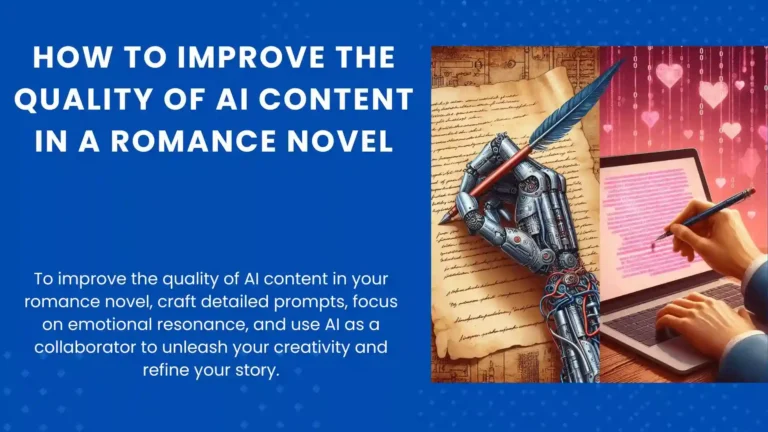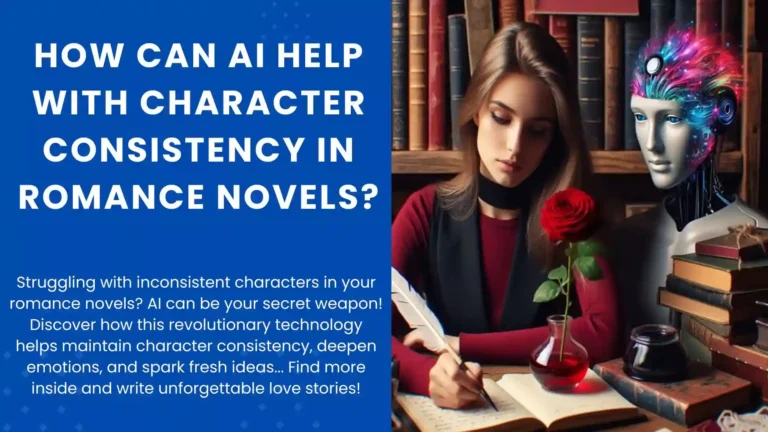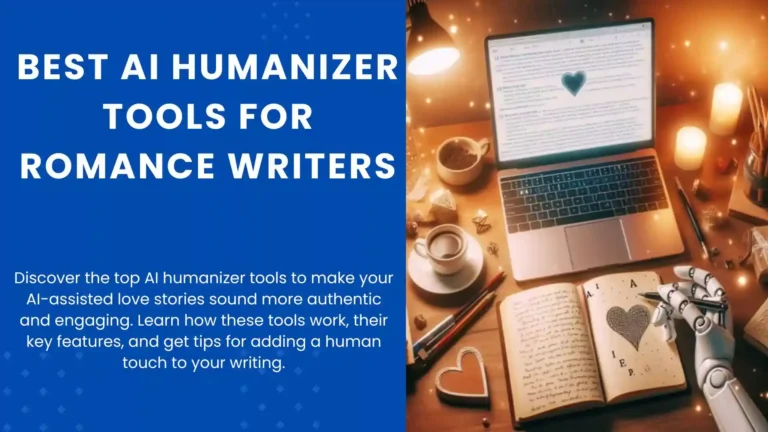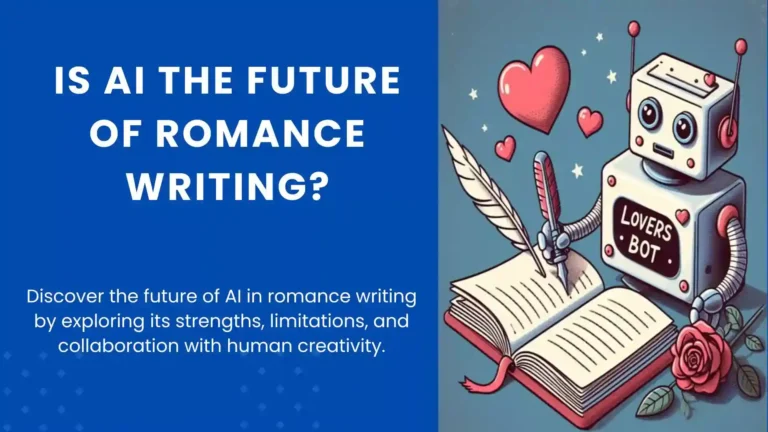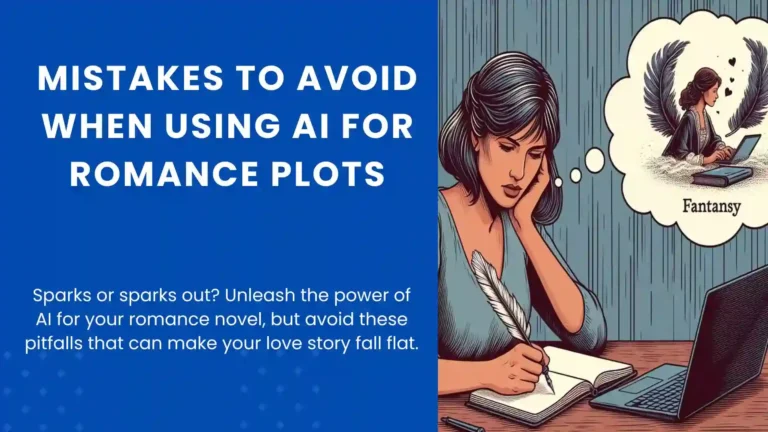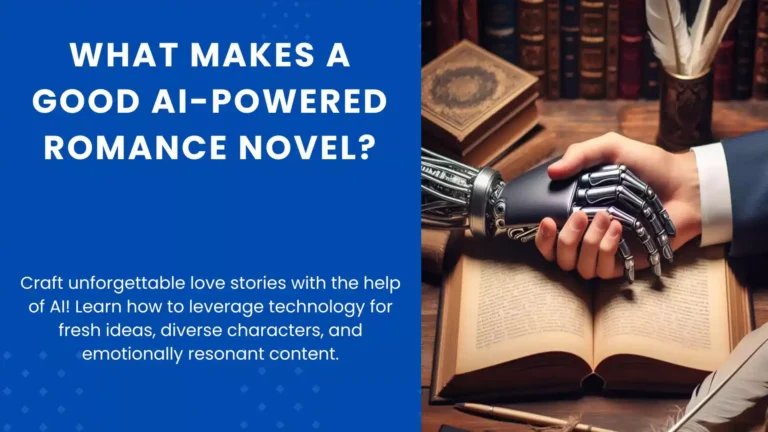From Awkward to Awesome: Write More Natural Dialogue in Your Romance Novels with AI
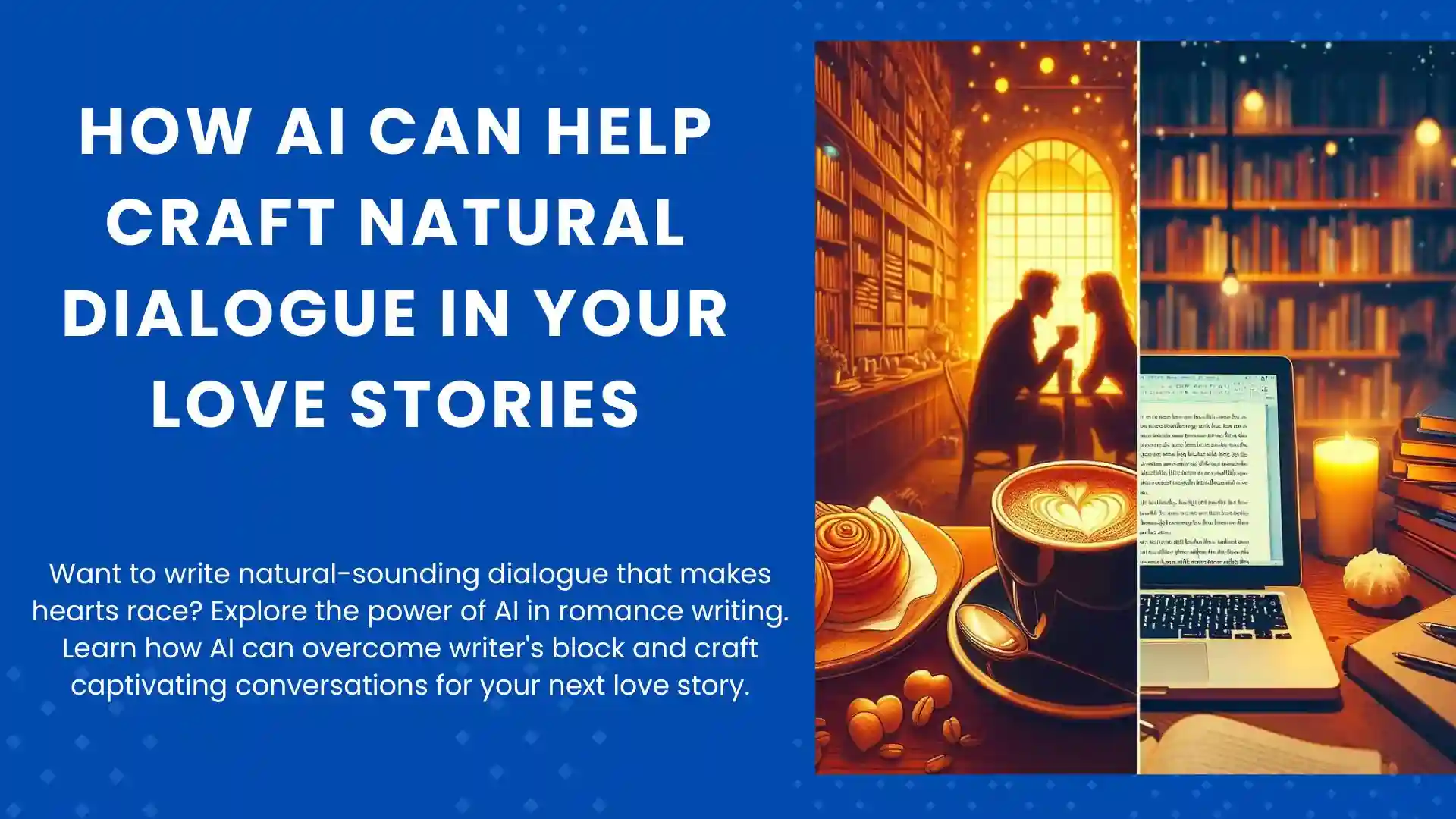
You know that feeling when you’re reading a romance novel and the dialogue between the characters just makes your heart race with anticipation?
It’s like you’re right there with them, feeling every flirty quip, every tender confession, and every moment of passion.
That’s the power of great dialogue in romance writing – the magic ingredient that pulls readers into the story.

But let’s be honest: it is not always easy to write that kind of amazing, natural dialogue where your characters sound like real people with their own unique voices and personalities.
And when the dialogue falls flat and feels fake, it can kill the heat in your romance scenes.
That’s where AI writing assistants come in.
I invite you to join me as I explore tips to help you craft natural dialogue for your love stories with AI.
I’ll also talk about the challenges and limitations to keep in mind and show you how to make the most of this valuable tool in your writing process.
Key Takeaways:
- AI can help you write better dialogue in your romance novels by giving you new ideas and making your characters sound more realistic.
- AI can spot awkward phrasing so your dialogue flows smoothly.
- Always personalize, refine, and humanize AI-generated dialogue to align with your unique voice and vision.
- AI can’t do everything! It might not always understand the hidden meanings or emotions behind what your characters are saying.
- Provide AI with clear prompts and character details for more accurate and tailored dialogue suggestions.
I. How AI Can Enhance Romance Dialogue
Have you ever stared at the blank page, trying to craft the perfect words for that heart-melting conversation between your characters?
Let’s see how AI can help you overcome writer’s block and create truly engaging dialogue for your love story.
A. Spark Inspiration and Fresh Ideas:
Imagine typing in something like, “Write a meet-cute scene where a shy librarian bumps into a confident musician at a crowded coffee shop.”
Within seconds, AI can spit out a unique scene starter like:
The coffee shop was bustling, with people chatting and hanging out. Lost in thought, the librarian didn’t notice the man in front of her until she crashed into him, spilling her books and his sheet music across the floor.
“I’m so sorry!” she gasped, dropping to her knees to gather the scattered papers. “I’m such a klutz.”
“No worries,” a deep, melodic voice chuckled. “I’ve been looking for an excuse to talk to you.” He knelt down, his hand brushing hers as they reached for the same book. “I’m Jake, by the way. I’ve seen you here before, always buried in a novel.”

She felt her cheeks warm as she met his emerald green eyes. “I’m Sarah. And you’re always scribbling in that notebook. Are you a writer?”
Jake grinned, holding up his guitar case. “Musician, actually. Just trying to find the perfect lyrics. Maybe you could help me sometime? Over coffee?”
Sarah bit her lip, surprised at the fluttering in her chest. “I don’t usually take literary advice from strangers. But for you, I might make an exception.”
See how AI can generate a cute, quirky dialogue that sets the stage for a blossoming romance?
And the best part? You can keep generating more prompts until you find one that really resonates with you and your story.
B. Refine Character Development:
You know how important it is for each character to have a distinct voice and personality, right?
It’s what makes your hero, heroine, and supporting cast feel like real people that your readers can connect with.
But sometimes, it can be tough to keep those unique voices consistent throughout your story.
Picture this: You’ve created a super funny character, a heroine who’s always got a quick, clever answer for everything. You wrote some jokes for her, but as you go through your draft, you notice that some of her dialogue falls a bit flat.
You can feed your AI tool the dialogue you’ve written for your heroine, and it will analyze her speech patterns, vocabulary, and sentence structure throughout the story.
Then, it will offer suggestions on how to make her dialogue even better and more in line with her personality.
C. Identify Awkward Phrasing:
Imagine you’ve just written a passionate exchange between your two main characters. The emotions are running high, and you want their words to reflect the intensity of the moment.
But later, you realize that although the sentences technically follow all the grammar rules, they just sound awkward. They don’t quite capture the mood you were going for and might disrupt the flow of your scene, making your readers cringe.
Just run your dialogue through an AI writing assistant to flag any sentences that might sound a bit off and offer suggestions for how to polish your dialogue until it shines!
For example, let’s say you’ve written something like: “Her heart was pounding in her chest, and she felt the heat of his gaze upon her face, causing her to feel flushed and flustered.”
An AI storytelling tool might suggest rephrasing it to something like: “Her heart raced as his smoldering gaze swept over her, igniting a flush of desire across her cheeks.”

AI ensures that every word, every phrase, and every sentence in your romance dialogue creates the mood and emotion you want to convey.
Your readers will be swept away by the natural, effortless flow of your characters’ conversations.
II. The Limitations of AI for Romance Writing:
Now, I know what you might be thinking: “If AI is so great at helping with dialogue, why do I even need to write my own romance novel? Can’t I just let the AI do all the work?”
Well, while AI is an amazing tool that can definitely help you create fantastic romance writing, it’s important to remember these tools cannot replace the human touch.
There are some things that AI just can’t quite grasp, no matter how smart it might be.
Let’s see!
A. Understanding Context and Subtext:
When it comes to writing a truly compelling romance, it’s not just about the words on the page. It’s about the deeper emotions, the unspoken desires, and the subtle hints that make your readers’ hearts flutter.
And that’s where AI can sometimes fall short.
Sure, AI can help you craft compelling dialogue and correct any awkward phrasing. But it might struggle to understand the deeper meaning behind your characters’ words.
It can’t quite grasp the subtext, the hidden messages that are so crucial in building the tension and chemistry between your hero and heroine.
Always remember that AI is just a tool, not a replacement for your own creativity and emotional intelligence.

Your unique perspective, your deep understanding of your characters, and your ability to convey complex emotions through the power of your words – are the things that will make your romance novel stand out from the crowd.
Let’s look at this example:
Let’s say your heroine, Sarah, is having a conversation with the hero, Jack. They both have strong feelings for each other that they haven’t directly expressed yet.
As they’re talking, Jack says something like:
“You know, Sarah, I’ve never met anyone quite like you. You’re so…different.”

Now, on the surface, this might seem like a simple compliment. But there’s so much more going on beneath the words.
The way Jack hesitates before saying “different,” the intensity of his gaze, the slight catch in his voice – all of these subtle cues hint at the depth of his feelings for Sarah.
An AI dialogue generator might suggest a response like:
“Thanks, Jack. I pride myself on being unique.”
While this is a perfectly fine response, it doesn’t quite capture the subtext of the moment. It doesn’t acknowledge the unspoken tension between them or the weight of Jack’s words.
Instead, you, as the writer, might write something like:
Sarah felt her heart skip a beat as she met Jack’s gaze. His eyes seemed to be searching hers, looking for something she couldn’t quite name. “Different,” she repeated softly, a small smile playing at the corners of her mouth. “Is that a good thing?“
Jack took a step closer, his hand brushing against hers in a way that felt both accidental and deliberate. “The best thing,” he murmured, his voice low and rough with emotion.
See how this exchange captures the subtext of the moment? The dialogue itself is simple, but it’s the description of their body language, the tone of their voices, and the unspoken emotions between them that really make the scene come alive.
That’s the kind of depth and nuance that AI might struggle to replicate but that a skilled writer like you can bring to the page.
B. Generic Dialogue Without Human Input
AI is great at analyzing patterns and generating text based on a huge amount of data it’s learned from. But what it can’t do is capture the unique voice and emotional depth that makes your romance novel truly yours.
Imagine if you used AI to generate all the dialogue in your romance novel without putting your own spin on it. Sure, the conversations might be decent enough, but they could end up feeling a bit flat.
Your readers might be unable to connect with your characters on a deep, emotional level because the dialogue doesn’t have that authentic, human touch.

And that’s why it’s so important to use AI as a starting point, not an endpoint.
For example, let’s say you use AI to generate a flirty exchange between your hero and heroine. The AI might give you something like:
“You look stunning tonight,” he said, his eyes twinkling.
She blushed and looked away. “Thank you. You don’t look so bad yourself.”
Not bad, right? But it’s a bit generic. So take that starting point and infuse it with your own unique style and emotional depth.
Maybe something like:
“You’re a vision in that dress,” he murmured, his gaze lingering on her curves. “I’m not sure I’ll be able to focus on anything else all night.”
Her heart skipped a beat at the heat in his eyes. “Well, I guess you’ll just have to find a way to keep your mind on the conversation, won’t you?” she teased, a playful smile tugging at her lips.
See? By humanizing AI-generated dialogue, you can create something that feels authentic and emotionally resonant.
C. AI as a Tool, Not a Replacement for your Writing Skill
When using AI, always remember that it is here to supplement and enhance your skills, not take over the whole show.
Consider it as a friend to help you brainstorm ideas, experiment with different dialogue styles, and find new ways to make your characters sparkle on the page.
However, at the end of the day, it’s still your story, your voice, and your unique perspective that will make your romance novel truly special.
AI is just a tool like any other and is not here to replace your own skills, creativity, and emotional intelligence. Those are the things that make you a one-of-a-kind writer with a story that only you can tell.
And who knows? With AI by your side, you might just discover new depths to your writing that you never knew existed.
You might find yourself taking risks and trying new things that you never would have dared to attempt before.
And that, my friend, is how you become the kind of romance writer that readers can’t resist.
III. Tips for Using AI Effectively in Romance Dialogue
Let’s now check some practical tips for making the most of this incredible tool and learn how to use it to create the kind of dialogue that will make your readers swoon!
A. Provide Clear Prompts and Character Details:
If you want AI to generate high-quality dialogue that truly fits your story and your characters, you need to give it some guidance.
The more information you can provide about your characters, their personalities, their backstories, and their relationship dynamics, the better AI will be able to capture their unique voices and create dialogue that feels authentic to your story.
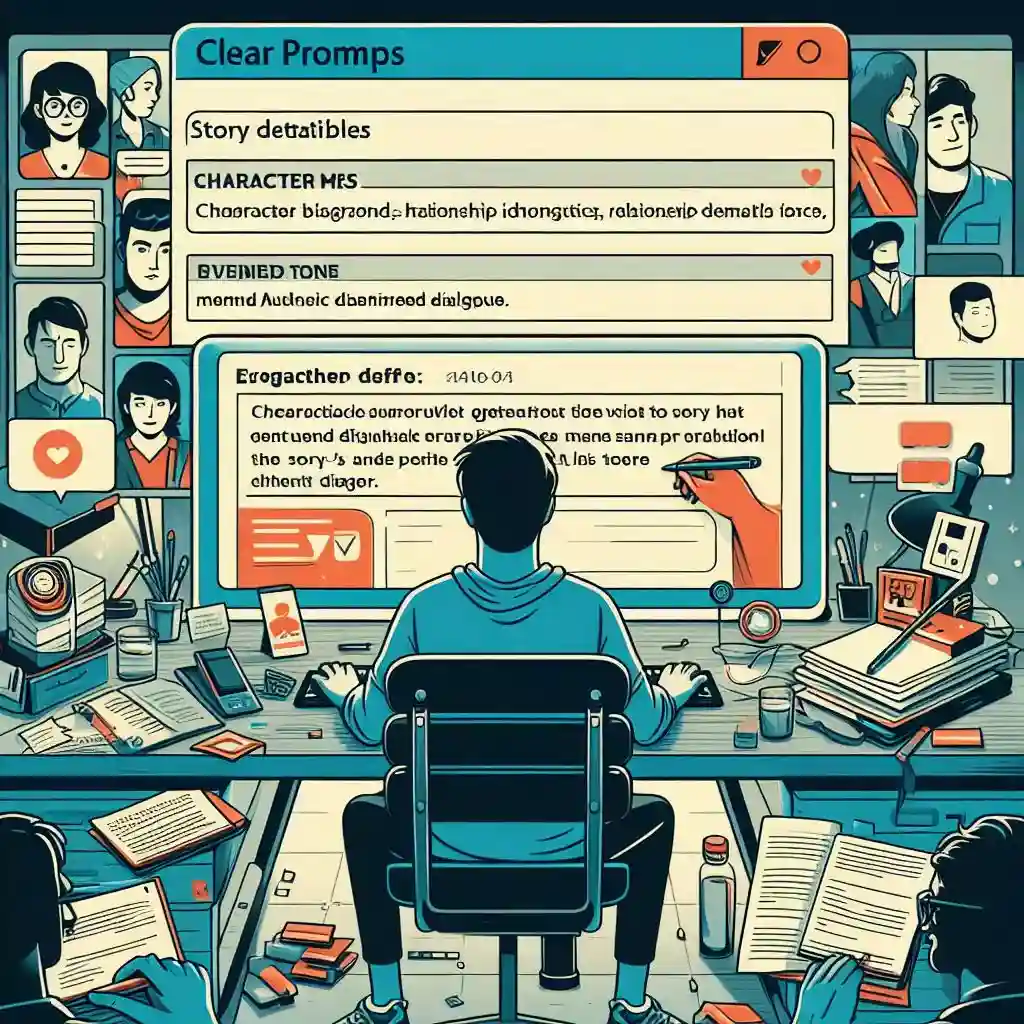
For example, let’s say you’re writing a scene where your heroine is finally confessing her feelings to the hero. You might give AI a prompt like this:
“Lila, a shy bookstore owner, is finally telling Jack, a charming but commitment-phobic travel writer, that she’s fallen in love with him. She’s nervous but determined, and she wants to express her feelings in a way that’s both heartfelt and vulnerable. The setting is a cozy coffee shop, and the tone should be emotional and intimate.”
See how much more specific that is than just saying “Write a love confession scene”?
By giving AI those extra details about your characters, the setting, and the desired tone, you’re helping it generate dialogue that truly fits your vision for the scene.
The more AI knows about your characters, the more it can help you bring them to life on the page.
B. Use AI Suggestions as a Springboard, Not a Script:
Now, let’s talk about how to actually use the dialogue that AI generates for you. It can be tempting to just copy and paste it straight into your romance novel, especially if it sounds pretty good on the first read.
But as we have stated above, think of AI-generated dialogue like a first draft but not the final product.
Just like you wouldn’t submit a first draft to your editor without revising and polishing it first, you shouldn’t use AI dialogue without putting your own spin on it.
Your romance novel is your unique story, your voice, and your vision. It needs your creative touch, your personal flair, and your deep understanding of your characters and their journey.
So when you get a piece of dialogue back from AI, don’t just accept it as is. Take a closer look and ask yourself:
- Does this truly align with my vision for this scene?
- Does it flow naturally with the rest of the conversation and the overall plot of my novel?
- Does it sound like something my characters would actually say?
If the answer is no, trust your gut and make the necessary changes!
Always use the AI-generated dialogue as a starting point to build upon and make your own.
IV. Final Thoughts: Craft Natural Dialogue For Your Love Stories With AI
AI is an incredible tool for any romance writer looking to craft natural-sounding dialogue. It can help you generate fresh ideas, refine your characters’ voices, and identify awkward phrasing, enabling you to create conversations that resonate deeply with your readers.
But here’s the thing: AI is just a tool. It’s not a magic wand that will instantly turn you into a bestselling romance author overnight.
Your unique voice, your creative vision, your deep connection to your characters and their journey – that’s what will make your romance novel truly unforgettable.
So, always revise, edit, and personalize the AI-generated content until it truly aligns with your unique style and voice.
One more thing: Writing romance is a joyful, creative process, and AI is here to make it even more enjoyable and rewarding.
Experiment with it and play around with different prompts and techniques, and to see where your imagination takes you.
Frequently Asked Questions (FAQs)
What are the benefits of using AI for dialogue creation?
AI can help create engaging, interactive dialogues quickly and efficiently. It can generate a variety of responses based on user input, making conversations feel more natural and dynamic.
Can AI write dialogue for different genres (e.g., sci-fi, romance)?
Yes, AI can write dialogue for various genres like sci-fi, romance, and more. By training AI models on genre-specific datasets and providing relevant guidelines, developers can adapt AI to generate dialogues that fit the desired genre.
How can I make my dialogue sound more natural?
To make your dialogue sound more like real conversations, use contractions (like “don’t” instead of “do not”), have characters interrupt each other, and let them speak in short, incomplete sentences. Give each character their own way of talking, and have them respond naturally to what others say. Reading it aloud helps check if it sounds genuine.
How does AI analyze existing dialogue for character development?
AI can analyze existing dialogue to understand character development by examining patterns and traits in their speech. It looks at word choice, sentence structure, and emotional tone to identify each character’s unique voice and personality. AI then uses this information to generate new dialogue that maintains consistency and authenticity for the characters.
Do I need to be a good writer to use AI for dialogue?
No. AI can help writers of all skill levels by generating ideas and suggestions. However, having strong writing skills allows you to better guide the AI, provide higher-quality input, and refine the generated content to create more compelling dialogues.
How can I improve my own dialogue writing skills?
To get better at writing dialogue, read a lot and pay attention to how characters talk in books, movies, and real life. Practice writing conversations and have others read them to give you feedback. Try acting out your dialogue to see if it sounds natural. The more you write and get constructive criticism, the more your dialogue skills will grow.
Does AI understand emotions in dialogue?
AI can identify keywords and patterns related to emotions in dialogue, but it may not fully grasp the nuances and complexity of human feelings. While AI can suggest emotionally appropriate responses based on context, you as the writer should use your own understanding of emotional expression to refine and enhance the dialogue, ensuring it accurately conveys the desired tone and depth of feeling.

